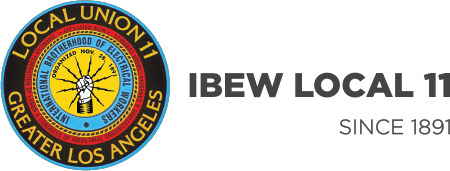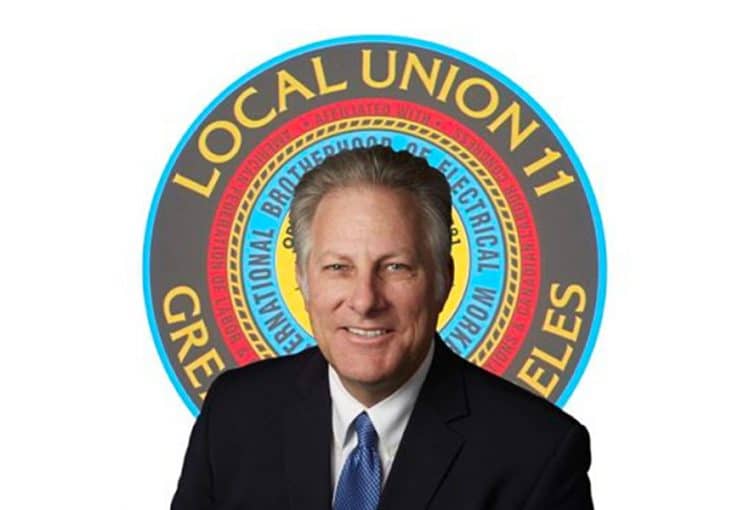Local 11 Compliance, Business Reps’ One-Two Punch Lands Big for Members
By Jeremy Kehoe
IBEW 11’s Compliance division notched a set of impressive wins in recent arbitration and Department of Industrial Relations cases against a major Southern California employer and a contractor that will result in more clearly defined work classifications for the electrical industry.
These victories were a culmination of union solidarity in the truest sense, with frontline business representatives and organizers in each district listening to members’ on-the-job concerns and then taking them to Compliance for action.
“Compliance and Local 11’s business representatives and organizers are very much married to each other because we share information, and they give me the information I need to perform the compliance actions and proceed with enforcement actions,” said Local 11’s Director of Compliance Veronica Martinez, a nine-year IBEW 11 member.
As Director of Compliance Martinez oversees activity of all the Locals’ units regarding PLA compliance, general prevailing wage laws, competitive bidding issues, Department of Industrial Relations, and Department of Labor disputes, and she also serves as chair of the LACCD’s Bond Oversight Committee.
Willful Non-Compliance
The first Local 11 Compliance victory was on a multi-million-dollar railroad installation project at the Port of Long Beach. Here, the railroad signal contractor promised it would exclusively assign all the signal removal and installation work scope to labor but instead willfully chose to violate the law by misclassifying workers and then paying them lower wages – a prevailing wage violation.
Christopher Longoria, business agent of Local 11’s Intelligent Transportation unit, brought the issue to Martinez after reviewing the scope of work and talking to members at the job site.
“We reached out to that contractor and said, ‘Hey, it’s our understanding that the wrong craft is doing is performing this scope of work. We need to fix it.’ That was kind of how everything started,” Longoria said. “It was a dispute between our signatory contractor who’s a C-10 license holder, which is an electrical contractor on paper, using laborers to do electrical work.”
Business reps like Longoria play a pivotal role as an on-site workforce agreement enforcer, a trusted confidant union brothers and sisters can turn to when they see rules violations and agreement infractions, and, finally, a liaison to Compliance if a contractor refuses to comply.
“Our job is to make sure members feel comfortable making that first phone call or email or text to talk things through and then have conversations to figure out how we can put any fires out at an early stage, and if we can’t then talk about what the strategy is moving forward,” Longoria said. “There are rules in the rulebook, but if a contractor pushes back on those and refuses to comply then that’s when I’m going to fall back on Compliance.”
Compliance then took that job site information provided by Longoria and began engaging with the awarding body to seek guidance from the DIR on work scope coverage. The DIR ultimately ruled in favor of Local 11 – determining that a large scope of the work being performed indeed belonged to the Inside Wiremen or Intelligent Transportation Systems classification.
“The contractor was willfully going to pay less than the prevailing wage and misclassify the workers,” Martinez said. “And that word – “willful” – is important because that is the determining factor as to the damages that are owed. The contractor outrightly was not willing to comply, and even after they were informed of their non-compliance they willfully chose to violate the law.”
“We prevailed and are now proceeding with prevailing wage enforcements with this contractor,” Martinez added. “It’s not only about getting a bad actor but leveling the playing field so that contractor won’t go to the next project and try to underbid a project.”
In fact, this same contractor is now scheduled to supervise similar railroad signal installation and removal at the Port of Los Angeles, where Local 11 members and business representatives will be keeping close tabs.
“We already told him, ‘We’re going to watch you. On every single project we’ll follow you wherever you go,’” Martinez said. “It’s a game of patience where we follow, we document, and we record over and over and over and show the different awarding bodies that he has previously violated prevailing wage laws and to not award work to them in the future.”
“It was important we dug our heels in on this one because it was an opportunity to set a precedent for work going forward,” Longoria said. “It’s important for our contractors to succeed, but they have to do it in the right way.”
Taking on a Refinery
Local 11’s Compliance unit also recently pursued – and prevailed in – its arbitration case against a refinery for their contracting of a non-union, electrical contractor to perform high-voltage electrical testing work, and for not complying to the terms of the PLA.
The arbitrator ruled that this refinery was found to not comply or follow the processes in the PLA for the award of this work, and that “the Union has met their burden to show that the work in dispute is “Covered Work” as defined in Article 2, SCOPE, or the PLA.”
Local 11 District 2 Business Representative Manny Solis, whose district includes the facility, regularly met with the job steward on-site, secured first-hand accounts from individual Local 11 members there about the violations, and then delivered these issues to Martinez for action.
“Through our members and myself and conversations with Veronica we were able to bring these violations to the forefront and even track all the work that was being done by this non-compliant contractor,” Solis said.
As a part of the arbitration decision the refinery has been ordered to pay damages to IBEW 11 for the loss of work.
“The Union is entitled to the health and welfare benefit payments that should have been made to the Union Trust for health and pension benefits that would have been made under the IW agreement,” Arbitrator David A. Weinberg wrote in his ruling.
Details of the settlement are still being finalized – Martinez again stressed the need for patience – but the arbitrator’s ruling was unambiguous.
Solis said the bedrock union values of solidarity, unity, and fraternity at every level were key to exposing these violations and securing a favorable ruling.
“I’ve been working in the refineries for the past 30-plus years and also taught at the ETI for five years, so I’ve built relationships with many of our members working there,” Solis said. “They know they can trust my word, and we can confide in each other. We were all on the same wavelength on this because we’re all brothers and sisters, and that’s how this brotherhood and sisterhood works – we take care of each other.”







